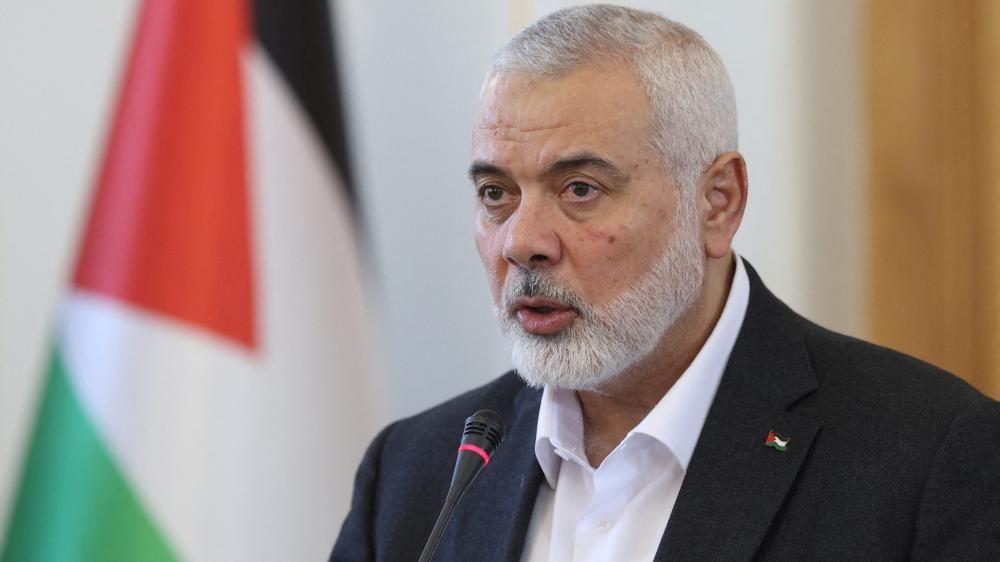Israel’s defence minister has for the first time acknowledged that Israel killed Hamas’s political leader Ismail Haniyeh in Tehran in July.
Israel Katz made the comments in a speech vowing to target the heads of the Iran-backed Houthi movement in Yemen, which has been firing missiles and drones at Israel.
Haniyeh was killed in a building where he was staying in the Iranian capital in an attack widely attributed to Israel.
Separately, Israeli Prime Minister Benjamin Netanyahu said some progress had been made towards agreeing a ceasefire in Gaza with Hamas, but he could not give a timeline for when a deal would be reached.
It comes after a senior Palestinian official told the BBC that talks between Hamas and Israel were 90% complete, but key issues remained.
In his speech, Katz said Israel would “strike hard” at the Houthis and “decapitate” its leadership.
“Just as we did with Haniyeh, [Yahya] Sinwar, and [Hassan] Nasrallah in Tehran, Gaza, and Lebanon, we will do so in Hodeida and Sanaa,” he said, referring to Hezbollah and Hamas leaders who have all been killed this year.
Haniyeh, 62, was widely considered Hamas’s overall leader and played a key role in negotiations aimed at reaching a ceasefire in the Gaza Strip.
After his assassination, Hamas named Yahya Sinwar, its leader in Gaza and one of the chief architects of the 7 October attacks, as the group’s overall leader.
Sinwar was killed by the Israeli military in a chance encounter in Gaza in October and the group is still in the process of choosing a new leader.
Hassan Nasrallah meanwhile was the leader of the Iran-backed Lebanese group Hezbollah – he was assassinated in Beirut in September as Israel dramatically escalated its military campaign against Hezbollah, with which it had been trading near daily cross-border fire since the day after the 7 October attacks.
The Houthis, an Iran-backed rebel group that controls north-western Yemen, began attacking Israeli and international ships in the Red Sea shortly after Israel began targeting Hamas in Gaza last October.
The group has vowed to continue until the war in Gaza ends.
On Saturday, Israel’s military said its attempts to shoot down a projectile launched from Yemen were unsuccessful and the missile struck a park in Tel Aviv. A Houthi spokesman said the group hit a military target using a hypersonic ballistic missile.
Last week Israel launched strikes against what it said were Houthi military targets, hitting ports as well as energy infrastructure in the Yemeni capital Sanaa. The US and UK have also attacked Houthi targets as part of an operation to protect international shipping.
Hamas attacked Israel in October last year, killing about 1,200 people and taking 251 people hostage.
In response, Israel launched a military campaign to destroy Hamas in Gaza which has continued for more than a year and has killed 45,317 people according to the Hamas-run health ministry in the Strip.
That figure includes 58 people killed by Israeli attacks over the past 24 hours, Hamas officials said. Local medical officials said that at least 11 people were killed in three separate strikes on the al-Mawasi area, which had been designated a “safe zone” by the Israeli military. Israel said it was targeting a Hamas fighter.
On Monday Israel said three of its soldiers had been killed in the northern Gaza Strip.
Humanitarian and rights groups have warned of a catastrophic situation for civilians in Gaza.
On Sunday Oxfam said just 12 trucks had distributed food and water in northern Gaza over the past two-and-a-half months and blamed the Israeli military for “deliberate delays and systematic obstructions”.
“For three of these, once the food and water had been delivered to the school where people were sheltering, it was then cleared and shelled within hours,” Oxfam added.
The Israeli authorities said the report was “deliberately and inaccurately” ignoring the “extensive humanitarian efforts made by Israel in the northern Gaza Strip”.
Israel insisted that specific shipments “including food, water, and medical supplies” had been sent to northern areas of Gaza, including Beit Hanoun, Beit Lahia and Jabalia, where the Israeli military has for several months been carrying out a military operation that it says is targeting Hamas fighters who had regrouped there.
The Oxfam report comes after rights groups Amnesty accused Israel of committing genocide in Gaza and Human Rights Watch (HRW) accused Israel of committing “acts of genocide” by deliberately depriving Palestinian civilians in Gaza of adequate access to water.
Israel’s foreign ministry described the Amnesty report as “entirely false and based on lies” while the Israeli foreign ministry’s spokesman said Human Rights Watch was “once more spreading its blood libels… The truth is the complete opposite of HRW’s lies”.
Read the full article here


